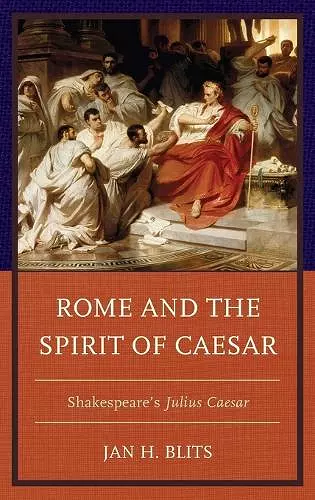Rome and the Spirit of Caesar
Shakespeare’s Julius Caesar
Format:Hardback
Publisher:Lexington Books
Published:17th Sep '15
Currently unavailable, and unfortunately no date known when it will be back
This hardback is available in another edition too:
- Paperback£42.00(9781498525282)

Rome and the Spirit of Caesar, providing a fresh interpretation of Julius Caesar, is a thorough examination of Shakespeare’s presentation of the final throes of republican Rome’s political decay and demise and the rise of Caesarism. As in his previous studies of Shakespeare’s plays, Blits, pursuing his distinctive approach, follows Caesar through, scene by scene, speech by speech, line by line, reaching his conclusions by closely examining Shakespeare’s text. Approaching the play as a coherent whole, he examines the whole in the light of its parts and the parts in the light of the whole. Since each presupposes the other, he considers the whole and its parts together. He carefully relates the play’s details to its major themes and grounds the themes in, and supports them by, the details. While intruding no literary theory on the play, Blits brings out the historical and perennial political substance that Shakespeare deliberately put into it. He shows that Caesar is a work of historical poetry, shaped by Shakespeare’s mastery of the Roman histories and the Hellenistic philosophies bearing directly on his subject. Topics include the love of honor and fame, heroic ambition and glory, virtue and honor, civic strife, political murder, the role of political oratory, public versus private interests, Caesarism, the decay of liberty, loyalty, demagoguery, luxury, spiritedness, superstition, Stoicism and Epicureanism, manliness, friendship, moral intimidation, political imprudence, foreign and civil war, universal empire, and the advent of Christianity.
In this detail-oriented, textually grounded reading of Julius Caesar, Blits looks at the play in the context of classical Roman politics and history, in doing so extending his earlier work on Shakespeare’s Roman plays . . . Taking issue with contemporary applications of literary and social theory to the play and with New Historicist approaches that read Shakespeare’s version of Rome through early modern English contexts, Blits argues for Shakespeare’s careful handling of Roman history as tempered by poetic demands. In his introduction, the author frames the play as attending to the historical, philosophical, and political nuances of the transition from republican to imperial Rome. The remainder of the book is structured to walk a reader sequentially through the play and illuminate Shakespeare’s engagement with classical sources. The book is careful and well argued, and it provides a coherent, thorough reading of the play. That said, it seems in many ways like a return to a much earlier critical tradition; readers’ responses are likely to be influenced by their own sensibilities about the critical trends Blits rejects. Summing Up: Recommended. Upper-division undergraduates and above. * CHOICE *
This is a valuable . . . contribution to the critical history of Julius Caesar. Its value lies principally in copious references to classical sources, which will prove to be useful to future editors of the play. * The Review of Politics *
In this his second book on Julius Caesar (his first, in 1993, The End of the Ancient Republic: Shakespeare's "Julius Caesar") Jan Blits confutes long held assumptions that Shakespeare's Romans are merely Elizabethans dressed in togas. Blits illuminates the political significance of the play by exploiting his familiarity with scores of classical Greek and Latin authors, drawing upon a learning unmatched in Shakespearean scholarship for its comprehensiveness as well as for its discernment. -- John Alvis, University of Dallas
By the end of Jan Blits’s book on Shakespeare’s Julius Caesar, the Roman Republic has, so to speak, committed suicide in the persons of its leaders, Brutus and Cassius, “who killed themselves in excessive haste.” So culminates Blits’s series of studies, in which he examines Shakespeare’s presentation, in a poem and three dramas, of the institution and the demise of the Roman Republic. Blits offers an act-by-act, scene-by-scene, sometimes even line-by-line interpretation of the play. It is informed by an unusual view, in opposition to much current scholarship, of Shakespeare as a superb rather than a flawed historian. Blits shows that the poet is accurate in historical detail and acute in political insight—that poetry has the power to penetrate historical persons and events. In staying clear of theoretical impositions and in attempting to understand the poet in his own terms, Blits succeeds in bringing out the play’s subtlety and depth. -- Eva T.H. Brann, St. John's College
ISBN: 9781498525268
Dimensions: 234mm x 160mm x 20mm
Weight: 435g
194 pages